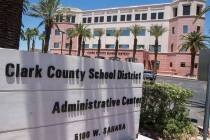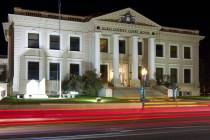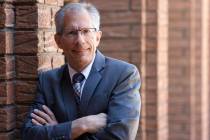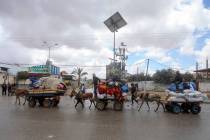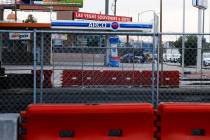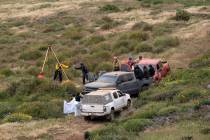Partnership would teach, treat
Three prestigious California medical centers are in serious discussions with the University of Nevada School of Medicine to provide sophisticated treatment of liver disease in Las Vegas.
The timing of conversations with Loma Linda University, UCLA and California Pacific Medical Center, which already has a part-time presence in Southern Nevada, isn't coincidental.
Six weeks ago, some 40,000 letters were sent to former patients of the Endoscopy Center of Southern Nevada by health care authorities urging them to get tested for blood- borne diseases including hepatitis C, an incurable, potentially fatal condition that attacks the liver.
Six cases of acute hepatitis C had been traced to the clinic, and now a seventh to a sister clinic. At this point, the need for medical treatment could not be ignored, said Blain Claypool, the Nevada medical school's chief operating officer.
At present, Nevada's medical school does not have a program in hepatology, which is the study of liver disease, nor is there a hepatologist treating patients full time in Las Vegas.
The three medical centers propose to partner with the medical school to set up a program that would both treat patients and teach medical students about liver disease.
"We are having active conversations with multiple parties to make sure those services are available in the community," Claypool said.
One of Nevada's large insurance coalitions asked the school of medicine three weeks ago to contact Loma Linda University Adventist Health Sciences Center about providing services, he said.
That Southern California health center, 240 miles from Las Vegas, includes a medical school, adult and children's hospitals, and research and transplant institutions.
Claypool wouldn't divulge which insurance company had made the request, but said the conversation about contacting Loma Linda University occurred "right in the thick of the hepatitis outbreak.''
Loma Linda University has already submitted a written proposal to the Nevada medical school.
The proposal describes how the university's liver transplant program would assist Nevada's only public medical school in establishing a hepatology program and services. The program would have an educational arm, said Dr. Zeid Kayali, medical director of Loma Linda's liver transplant program.
Representatives of San Francisco's California Pacific Medical Center have spoken to Nevada medical school officials about how they would help set up a program.
On Thursday, a liver surgeon from UCLA toured the medical school and met with staff at the medical school.
Before the outbreak, Las Vegas Mayor Oscar Goodman had been working to bring to Nevada physicians associated with UCLA, the world leader in liver transplants. Since the outbreak, Goodman has stepped up discussions that have largely centered around bringing liver specialists from the Los Angeles university to Las Vegas in a clinic setting.
Goodman said he has hated to see the emotional and physical pain suffered by Southern Nevadans because of the outbreak.
"We need to get first-class health care in Las Vegas," he said. "It is embarrassing to have banners going across CNN and MSNBC talking about our city and a hepatitis outbreak."
Like UCLA, Loma Linda University had been considering liver treatment programs in Las Vegas. But the hepatitis outbreak made them step up their efforts.
Dr. Thomas Sibert, associate vice president of UCLA's David Geffen School of Medicine and head of outreach services, said Wednesday he envisions UCLA physicians -- probably a hepatologist and a liver surgeon -- working twice a month in a clinic for liver problems at University Medical Center, which is affiliated with the Nevada school of medicine.
The medical director of California Pacific's liver transplant program, Dr. Robert Gish, envisions a similar partnership.
For the past two decades, Gish has treated patients on a part-time basis in Nevada.
His practice on behalf of California Pacific has flown specialists to Nevada once a month to consult with and treat patients diagnosed with liver disease. His staff now spends eight to 12 days in Southern Nevada and Northern Nevada each month seeing about 150 patients. Roughly 10 percent of those patients need liver transplants. About 50 percent have hepatitis C, and the rest are patients with other liver problems such as hepatitis B and fatty livers.
"There's a lot of dialogue right now to step up efforts," Gish said, who teaches part time at the Nevada medical school. "Right now, we're providing help to patients, but there's going to be a need for liver specialists to be here full time."
MORE PATIENTS, MORE DEMAND FOR TREATMENT
To date, the Southern Nevada Health District has definitively linked seven acute hepatitis C cases to two endoscopy centers owned by Dr. Dipak Desai and others. Health officials believe six of the seven contracted hepatitis C at the Endoscopy Center of Southern Nevada, 700 Shadow Lane, because of unsafe injection practices. A syringe would be reused on a patient and then used to draw anesthesia from a vial intended for just one patient. The vial would be used on other patients, potentially spreading disease.
Lawyers for some 600 former patients of the Shadow Lane facility, and Desert Shadow Endoscopy, 4275 Burnham Ave., say their clients have tested positive for the virus because of the injection practices.
Thousands of patients have retained attorneys.
No one knows for sure how many of the patients will eventually test positive for the blood-borne disease as a result of practices at the clinic.
Public health officials estimate that roughly 4 percent of the patients would have had the often silent disease before their treatment at the clinic began, because of the older age of typical clinic patients. Regular screening since 1992 of the blood supply used for infections has reduced the rate of infection.
The 4 percent figure means that about 1,600 of the 40,000 patients notified would test positive for hepatitis, based on projections by the Centers of Disease Control and Prevention, according to Brian Labus, senior epidemiologist of the Southern Nevada Health District.
Despite the current emphasis on liver conditions, Goodman said he would like UCLA to have a broader role.
"I think the people who live here want the very best in medicine," Goodman said. "We want to be a world-class city. "
A few years ago, Goodman was among several Nevada public figures pushing for the Cleveland Clinic and the University of Pittsburgh Medical Center, established academic medical centers, to set up shop here.
Sibert said UCLA's involvement in Las Vegas now would be "far more modest" than the kind of partnership Goodman had envisioned. Both institutions, recognized internationally for overall health care, were interested in opening full-scale operations in Las Vegas.
"Those projects were grand, but they raised some anxiety among doctors and hospitals,'' Sibert said. "We're really not here to take their daily bread."
ADDED BENEFITS
Kayali said a hepatology program here would help educate both the public and the medical community.
"People need to know what hepatitis C really means, how people develop complications, what impact it has on the liver, and whether or not one can give it to their partners,'' he said, adding that a critical component of the partnership is teaching young medical students how to treat liver disease.
The Centers for Disease Control have reported that only 20 percent of people with hepatitis C have symptoms of the disease.
Common routes of infection include the sharing of needles in drug use, needle stick accidents among health care workers, and blood to blood contact that might occur during sexual activity.
Not to be overlooked is how having a hepatology center at the Nevada medical school would make life easier for Southern Nevadans dealing with a serious disease.
Said Julie Humeston, a registered nurse and director with Loma Linda University's Transplantation Institute, "They shouldn't have to drive three hours to come to us."
Contact reporter Paul Harasim at pharasim@reviewjournal.com or 702-387-2908. Contact reporter Annette Wells at awells@reviewjournal.com or 702-383-0283.









